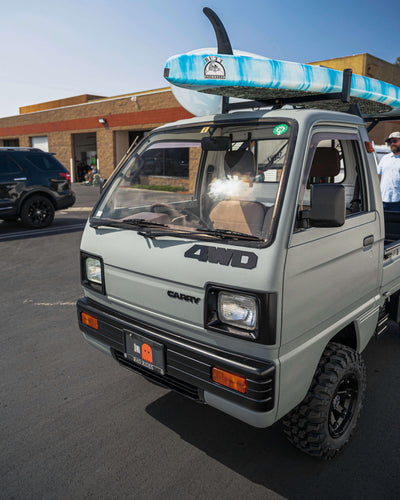Kei trucks, also known as mini trucks, are small, versatile vehicles from Japan that have gained popularity in the United States for their compact size, fuel efficiency, and practicality. As interest in these vehicles grows, many potential owners and enthusiasts are curious about their legality in different states. Louisiana, with its diverse landscapes and rural areas, presents unique opportunities and challenges for kei truck usage. In this comprehensive blog post, we will explore whether kei trucks are legal in Louisiana, examining federal and state regulations, necessary documentation, and real-life experiences from owners.
Understanding Kei Trucks
Kei trucks belong to a category of small vehicles that adhere to specific size and engine displacement limits set by Japanese regulations. Typically, these trucks have engines under 660cc and dimensions that make them exceptionally maneuverable and efficient. Despite their small size, kei trucks are known for their durability and versatility, making them ideal for various utility tasks, including agriculture, construction, and commercial use.
Federal Regulations for Kei Trucks
To understand the legality of kei trucks in Louisiana, it's essential to start with federal regulations. The United States enforces strict import regulations to ensure that all vehicles meet safety and emission standards. Kei trucks, being foreign imports, must comply with the Federal Motor Vehicle Safety Standards (FMVSS) set by the National Highway Traffic Safety Administration (NHTSA).
A significant aspect of federal law is the 25-year rule, which exempts vehicles older than 25 years from complying with FMVSS. This rule simplifies the importation and legalization process for classic and vintage kei trucks. However, newer kei trucks must meet these stringent safety and emissions standards, which can be challenging due to their unique design and specifications differing from typical U.S. vehicles.
Louisiana's Specific Regulations
Louisiana has specific requirements for titling and registering kei trucks. Below are the detailed steps and requirements for titling and registering kei trucks in Louisiana.
Titling and Registration Requirements for Imported Vehicles
When an owner obtains a foreign vehicle originally manufactured for sale outside of the United States or a vehicle that is currently titled in a foreign country, the following documents must be presented to obtain a certificate of title:
- Vehicle Application Form (DPSMV 1799): Completed form.
- Original Out-of-Country Title/Registration or Manufacturer's Statement of Origin: Original document.
- Original Bill of Sale: Document proving purchase.
- Proof of Current Insurance: Insurance documentation.
- Security Agreement: If applicable, a copy of the security agreement.
-
U.S. Customs Forms: One of the following indicating satisfactory proof of Customs entry:
- CF 368 - Collection Receipt or Informal Entry
- CF 3299 - Declaration for Free Entry of Unaccompanied Articles
- CF 3311 - Declaration for Free Entry of Returned American Products
- CF 3461 - Entry/Immediate Delivery
- CF 3461 ALT - Entry/Immediate Delivery
- CF 6059B - Customs Declaration
- CF 7501 - Entry Summary
- CF 7523 - Entry and Manifest of Merchandise Free of Duty
Additionally, the following forms are required:
- EPA Form #3520: Stamped "Released by Customs" or electronically released in the above listed forms.
- Highway Safety Form 7: Issued by the Department of Transportation and stamped "Released by Customs."
- Affidavit of Physical Inspection: Performed by a certified law enforcement officer.
Mini-Truck Classification and Registration
According to Louisiana law, mini-trucks meeting the following criteria are required to be titled and registered:
- Speed: Top speed of 65 mph.
- Equipment: Must have headlamps, front and rear turn signal lamps, tail lamps, stop lamps, exterior mirror on the driver's side, exterior or interior mirror on the passenger's side, parking brake, windshield wiper, speedometer, odometer, braking for each wheel, seat belt assembly for each designated seating position, and a vehicle identification number.
Mini-trucks may be operated on highways with a posted speed limit of 55 mph or less, except on interstates or controlled access highways.
Documentation for Titling Mini-Trucks
- Vehicle Application Form (DPSMV 1799): Completed form.
- Manufacturer's Certificate of Origin: If the certificate is in a foreign language, a notarized translation is required.
- Itemized Invoice: Showing complete description of the vehicle.
- Odometer Disclosure Statement: Properly completed and signed.
- Security Agreement: Original or copy if a lien is to be recorded.
- Proof of Liability Insurance: Insurance documentation.
- Statement from Purchaser: Indicating that the mini-truck contains all required equipment and that the owner is aware of the usage limitations.
- Off-Road Decal: Mini-trucks will be issued an off-road decal.
On-Road Use of Kei Trucks
Kei trucks can be used on public roads in Louisiana if they meet the necessary requirements and comply with general vehicle standards for safety and emissions. This includes having essential safety features such as seat belts, mirrors, and proper lighting systems. The truck must also pass an emissions test, which can be a significant hurdle for vehicles not originally designed to meet U.S. emissions standards.
Off-Road Use and Agricultural Exemptions
Kei trucks are popular for off-road use and specific applications such as agricultural purposes in Louisiana. In rural areas and on private property, kei trucks can be utilized without adhering to stringent regulations required for on-road use. This makes them a favored choice for farmers, ranchers, and businesses operating in off-road environments.
Modifications for Compliance
For those determined to use kei trucks on Louisiana's public roads, modifications may be necessary to meet the state’s requirements. Common modifications include upgrading safety features, such as adding seat belts, improving lighting systems, and installing emissions control devices to comply with state standards.
Owners may need to work with specialized mechanics or companies familiar with kei trucks to ensure they meet all regulatory standards. After making these modifications, the vehicle must pass an inspection by the DMV to be approved for on-road use.
Real-Life Experiences and Success Stories
Many kei truck owners in Louisiana have successfully navigated the regulatory landscape to register and drive their vehicles legally. These owners often share their experiences and tips in online forums and social media groups dedicated to kei trucks and other imported vehicles.
One common piece of advice is to consult with local DMV offices to understand the specific requirements and processes involved. Networking with other kei truck enthusiasts can also provide valuable insights and recommendations for trusted mechanics and modification services.
Conclusion: Navigating the Legal Landscape
In conclusion, while kei trucks face regulatory hurdles for on-road use in Louisiana, they can still be valuable for off-road and agricultural purposes. Understanding federal and state regulations, gathering the necessary documentation, and making necessary modifications are crucial steps in this process. By staying informed and seeking guidance from experts and fellow enthusiasts, you can navigate the complexities of making a kei truck legal in Louisiana and enjoy the unique benefits these compact vehicles offer.
Whether you are considering a kei truck for its practicality, fuel efficiency, or as a unique addition to your vehicle collection, knowing the legal requirements and options available in Louisiana is essential. Stay informed, and connect with the kei truck community to successfully navigate the path to legal and practical use.

